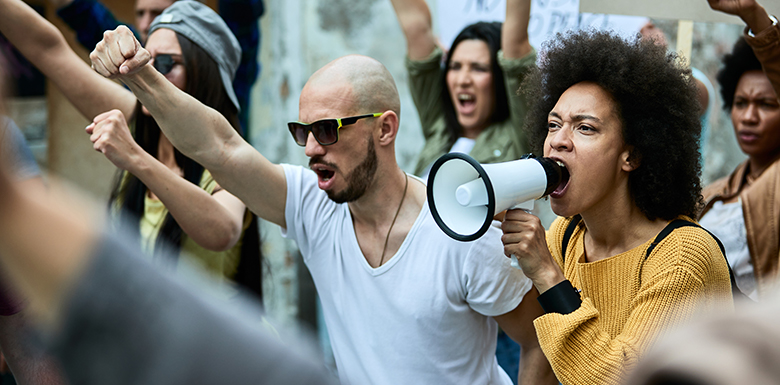Tougher Laws for Protesters Coming to Florida?

Cities across the country continue to see sustained protests, some of which have led to police-involved violence and property damage. Protests began in the summer as a response to police brutality and killings. The death of George Floyd in Minneapolis was a flashpoint. Since then, tensions around the presidential election have grown, concerning law enforcement and state leaders.
Some states, including Florida, are trying to limit individuals’ right to take to the streets to voice their concerns. On September 21, Florida Gov. Ron DeSantis introduced a bill that would create several new protest-related crimes and harshly punish protesters if they become disruptive or violent.
While the proposed bill isn’t law, there are still many criminal laws the police and prosecutors are using against protestors. If you, a friend, or relative were arrested at a protest in Tampa, contact Metcalf Falls, Criminal Defense Attorneys, P.A. immediately.
You can use the online contact form or call (813) 258-4800 to schedule a free, confidential consultation.
DeSantis Proposes the Toughest Protest Crime Bill in the Country
DeSantis introduced the “Combatting Violence, Disorder and Looting and Law Enforcement Protection Act” in late September 2020. The Act does several things. It creates new crimes, most of which are felonies. It harshly punishes those offenses, and increases penalties for certain offenses that already exist.
The new offenses include:
- Prohibition on Violent or Disorderly Assemblies: It would be a third-degree felony if seven or more people were involved in an assembly, and someone caused damage to property or injury to others.
- Prohibition on Obstructing Roadways: It would be a third-degree felony to obstruct traffic during an unpermitted protest, demonstration, or violent or disorderly assembly. A driver would not be liable for injury or death caused when driving through the crowd.
- Prohibition on Harassment in Public Accommodations: It would be a first-degree misdemeanor for someone in a violent or disorderly assembly to harass or intimidate anyone at a public accommodation, like a restaurant.
- Prohibition on Destroying or Toppling Monuments: It would be a second-degree felony to destroy public property during a violent or disorderly assembly.
- RICO Liability: You could be liable if you organized or donated money to a violent or disorderly assembly.
There are several potential issues with these offenses. One concern is who declares if a protest becomes violent or disorderly? The police.
Given the history of racism in Florida and its criminal justice system, the police may use whatever excuse they need to label a constitutionally allowed protest as violent or disorderly. Doing so would give them the right to respond with force and arrest participants for felonies.
Harsher Criminal Procedures and Penalties
DeSantis is targeting protesters with more than new crimes. He’s also significantly punishing protestors who are arrested, charged, and convicted, beginning with taking away their right to bail.
The bill would implement:
- No Bail: No one could receive bond or bail until their first appearance in court if charged with a crime related to participating in a violent or disorderly assembly. There would also be a rebuttable presumption against bond or bail after the first court appearance.
- Offense Enhancements: There would be offense or sentence enhancements for throwing an object during a violent or disorderly assembly that strikes a civilian or law enforcement officer; assaulting a law enforcement officer during a violent or disorderly assembly; participating in a violent or disorderly assembly when you’re from another state.
- Mandatory Minimum: Striking a law enforcement officer, including with a thrown object, during a violent or disorderly assembly would lead to a six-month mandatory minimum jail sentence.
- Government Employment and Benefits: Conviction of one of these crimes ends state benefits, like unemployment or food stamps, and would make a person ineligible for employment by a state or local government.
Additional Consequences for Local Governments
DeSantis also proposed changes that would make it difficult for local governments to decide how to budget and manage their own police forces.
- Victim Compensation: The law would allow a victim of a crime related to a violent or disorderly assembly to sue the local government for damages when that government was allegedly grossly negligent in protecting persons and property.
- No “Defund the Police” Permitted: The law would prohibit state grants or aid to any local government that reduces its budget for law enforcement services.
Will the Act Become Law?
We don’t know yet whether the Act will become law in Florida. When DeSantis announced his proposed legislation, the full bill was not made available to the public. That means we don’t know what text legislators will review and decide on. At the announcement, the governor urged lawmakers to pass the bill in November, before the normal legislative session begins in March 2021. However, we can expect this to be a conversation in 2021.
Were You Arrested at a Protest?
The truth is that there are already laws on the books against violence, property damage, vandalism, arson, and anything else that can go wrong during a protest. You can be arrested if the police believe you’ve committed a violent crime, such as assault or battery against a police officer or other civilian. You can be arrested if you appear to be involved in damaging another person or business’s property.
We’ve seen widespread arrests for these offenses. But they don’t always lead to charges or convictions. You can beat the charges. Avoiding a conviction requires navigating the criminal justice system and protecting your rights. The best way to do that is to hire an experienced Tampa criminal defense attorney.
Reach out to Metcalf Falls, Criminal Defense Attorneys, P.A. at (813) 258-4800 or online. We offer free, no-risk consultations and are available 24/7.
